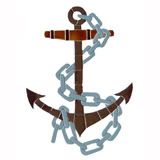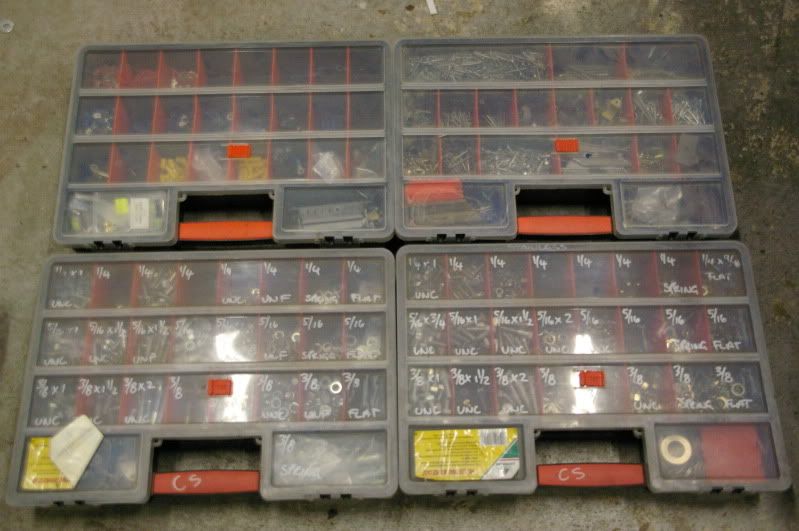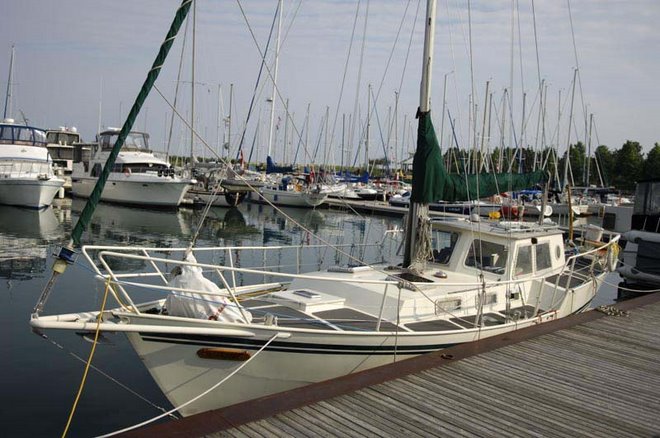
The black box theory is where maintenance and superstition meet and decide to tighten every hose clamp a quarter-turn. It's why I sniff the bilges and why I haul on the stays to check tension. Yes, even in Lake Ontario. Basically, the theory, which the marine writer John Vigor seems to have first codified, states that there is a "black box" of preventive maintenance to which the prudent mariner can contribute by vigilance and by keeping track of when certain parts of the boat were last observed critically. Withdrawals from the black box are made when the shackle works loose...but you moused it so it doesn't come completely apart, or when you have to run the engine at redline RPM for hours...but you changed the oil and checked the belts and shaft alignment early and often.
 |
| This is like 50 lawyers at the bottom of the sea. |
The theory posits that the sea is an inherently destructive place to the works of man, but that the destruction can be anticipated, forestalled and ultimately managed away from the realm of catastrophe and into the realm of "well, I'd better fix that before it becomes a nuisance." Anyone in what my fellow metal boat owner Cap'n. Matt calls "the sailing game" knows that there are people whose boats experience one damn thing after another, including potentially dangerous and usually expensive failures. Also known are the skippers who putter around, keep logs, have enough mechanical ability to fix (or at least not destroy through ignorance) most parts of their boat, and whose bilges are generally clean and whose boats are dry, comfortable and not prone to mysterious drips, noises or faint whiffs of burning.
They aren't "lucky". They are regular contributors to their black boxes.
It's one thing to be a survivor, but quite another to be a survivor who was put into the survival situation because of lack of foresight, lack of maintenance or lack of knowledge. While it's stupid and neurotic to think you can anticipate every problem, or avoid every bad situation, the simple fact that one does a reasonable job of checking pilots, forecasts and the state of repair of the boat means that when the crises come, you aren't thinking "did I forget to tighten Bolt 12754? Did I dog down Hatch G?" Instead, you're focusing on dealing with the events or processes that you can't control, like unforecasted weather or some random event.
Example of a random event:
Back in late September of this year (2009), I brought my old 33-foot sloop back to my club in order to get it ready for winter and, regretfully, to probably sell it in the spring (long, other story). After shutting it down, tidying up and securing the lines, I decided, not atypically, that I merited a pint of Guinness. While sipping, the bar phone rang and some words were exchanged. I asked what was up, and was told that it was our club's race committee boat who had failed to raise the dockmaster (the young man who takes lines and drives the water taxi, actually). The committee boat, a 38-foot trawler design, was adrift and heading for the States. The last Wednesday night club race had to be abandoned.
I got involved when the dockmaster (whose VHF channel, 68, the committee boat perhaps had not been hailing) said that he was not qualified to run either the club's crash boat or our 1940s-era work boat. So my plans to get home in time for dinner were put on hold, as I have driven both boats as part of our volunteer hours scheme. We hopped into the crash boat and zoomed through a horde of sailboats, some still obviously racing. We got to our committee boat to find that a 37-foot Peterson sailboat had her under tow already, but we hung around to "shepherd" the pair back in case the sailboat's engine got overworked, as the committee boat isn't light, and sailboats, particularly racers, make poor tugboats. I hung around nearby in the crash boat in case the committee boat needed nudging under the crane.
Once safely back, I learned that the committee boat had anchored at the start line as per usual, and had started the race. They then hauled anchor and were preparing to move to establish a finish line when their prop was fouled...badly. It turns out that they had snagged an entire, mussel-encrusted, bottom-dwelling spinnaker trailing shackles and line with their anchor, and that the current had sent this surprise package streaming back into the prop, gumming it up properly. Result: dead in the water and drifting rapidly south-east.
Personally, while I've heard of fouled props and fouled anchors, I have never heard of this: dragging up an entire spinnaker straight into the blades. That's the sort of stuff the sea (or in this case, a Great Lake) can throw at a sailor (or in this case, a race committee). That's the reason you do maintenance, keep logs and listen to forecasts: one less thing to worry about!





No comments:
Post a Comment